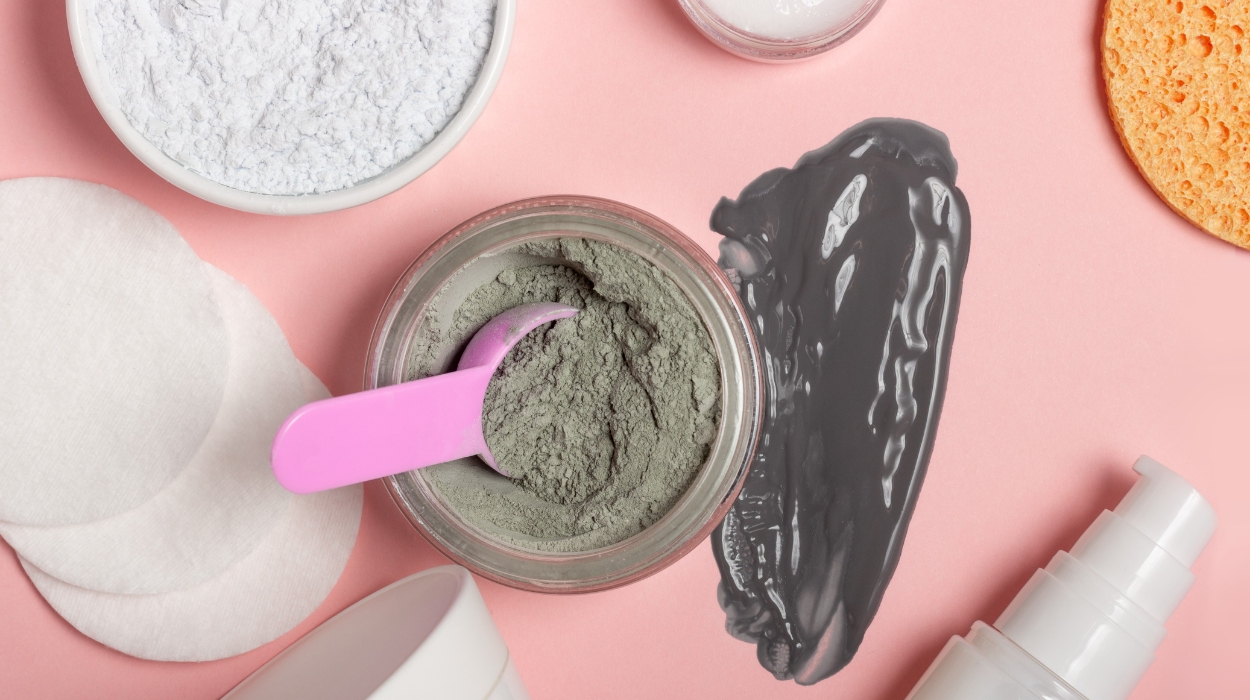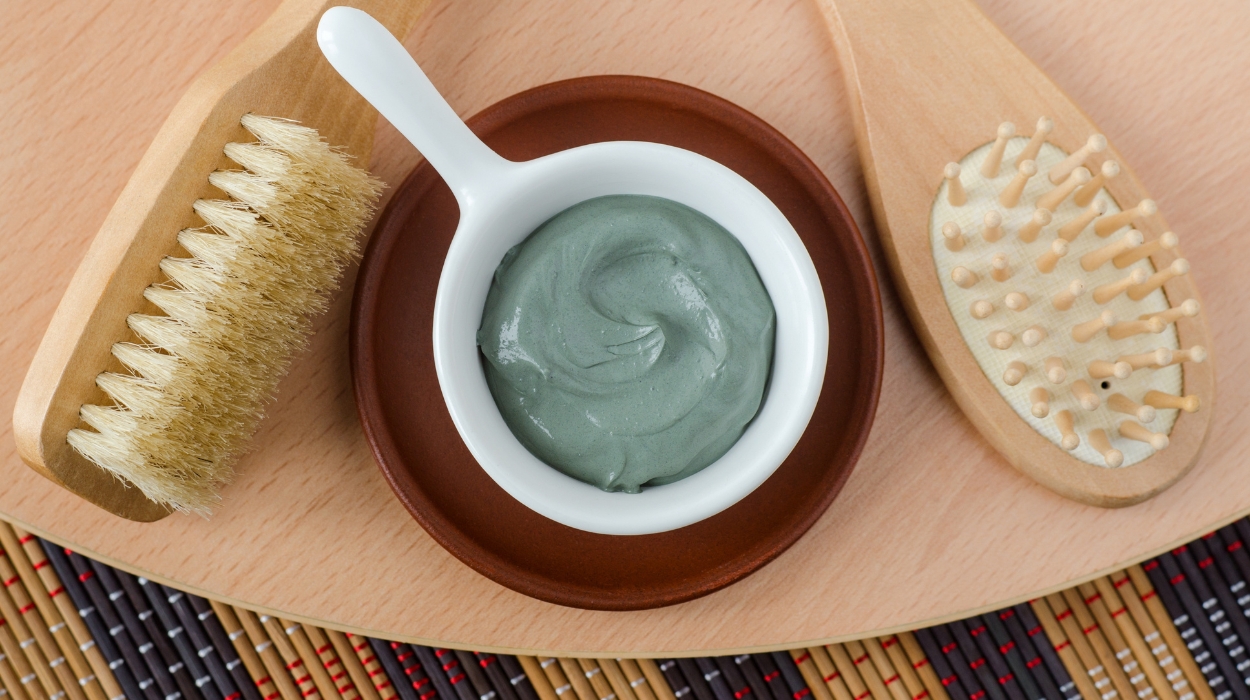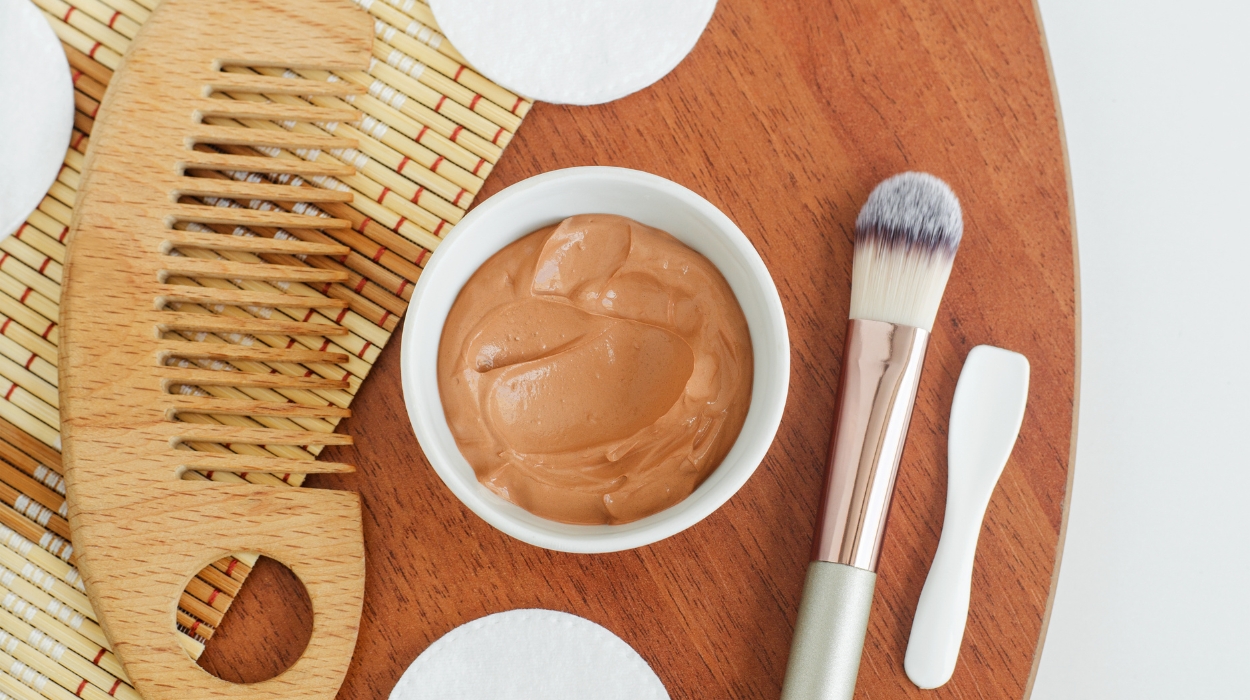 Expert's opinion
Expert's opinion
Expert's opinion
The article is a subjective view on this topic written by writers specializing in medical writing.
It may reflect on a personal journey surrounding struggles with an illness or medical condition, involve product comparisons, diet considerations, or other health-related opinions.
Although the view is entirely that of the writer, it is based on academic experiences and scientific research they have conducted; it is fact-checked by a team of degreed medical experts, and validated by sources attached to the article.
The numbers in parenthesis (1,2,3) will take you to clickable links to related scientific papers.
Bentonite Clay For Hair 2024: What Is It And How Does It Work?

In the search for luscious and healthy locks, many of us turn to natural hair remedies. Thanks to their affordability and gentle effects, essential oils and treatments are great options. And amidst this all-natural quest, one extraordinary ingredient stands out: bentonite clay.
Known for its detoxifying and clarifying properties, this versatile powder has gained popularity as an effective addition to a natural hair regimen. It aids with numerous hair-related concerns, such as dryness, frizzy hair, and breakage. Read on to learn more.
Key Takeaways:
- Bentonite clay is a natural clay commonly used in hair care routines.
- It’s formed from volcanic ash and is rich in numerous natural minerals, such as calcium, iron, and magnesium.
- Its benefits for hair include cleansing and detoxifying the scalp and balancing oil production. It can also nourish hair to promote healthy hair growth and remove product buildup.
What Is Bentonite Clay For Hair?
Also known as Montmorillonite clay, bentonite clay is a naturally occurring mineral derived from volcanic ash. It’s rich in various minerals,[1] including calcium, iron, copper, manganese, and zinc. These minerals are beneficial for the skin and hair and have nourishing and strengthening effects.
Amazing Bentonite Clay For Hair Benefits

Here are some of its most remarkable benefits for hair:
Cleansing And Detoxifying The Scalp
Bentonite clay is a potent cleanser. It may help[2] remove impurities, excess oil, and product buildup from the scalp. Its unique adsorbent properties enable it to attract and bind to toxins and dirt, leaving the scalp refreshed and rejuvenated.
Balancing Sebum Production
Bentonite clay may have the ability to regulate excess sebum production on the scalp. Excessive sebum, an oily substance found in the skin, can lead to greasy, weighed-down hair, and a lack of sebum can result in dryness and flakiness. Bentonite clay might help balance your hair’s natural oils, preventing both extremes and promoting a healthier scalp and hair.
Nourishing And Conditioning Hair
Bentonite clay is packed with essential minerals, such as calcium, potassium, and magnesium, which help nourish and hydrate hair follicles. These minerals penetrate the hair shaft, strengthening it from within and improving overall hair health. As a result, you can enjoy hair that is more manageable, lustrous, and resistant to breakage, regardless of your hair type.
Promoting Hair Growth
Through detoxifying the scalp and unclogging hair follicles, bentonite clay creates an optimal environment for hair growth. It removes barriers that may keep hair follicles from receiving nutrients and functioning correctly, allowing the hair to grow more easily.
Removing Product Buildup
Styling products, pollution, and hard water can leave behind stubborn residue on the hair strands. This can lead to problems like dandruff, itchiness, and even seborrheic dermatitis. Bentonite clay acts as a powerful clarifying agent, effectively removing these accumulated residues and restoring the hair’s natural vitality and shine. Regular use can leave your hair feeling fresh, light, and rejuvenated.
How To Use Bentonite Clay For Hair Growth

There are several options for making a bentonite clay mask at home. Some people use water to activate their clay masks, but you can also use apple cider vinegar, aloe vera juice, or herbal infusions for added benefits.
For deep moisture or soothing properties, you can also enhance the clay mixture with additional ingredients, like essential oils, honey, or melted coconut oil. Whatever you choose, it’s important to ensure your added ingredients are safe for skin and natural hair.
DIY Bentonite Clay Hair Mask Instructions
Ingredients
- Bentonite clay: Choose a high-quality, pure bentonite clay powder for hair, preferably sourced from a reputable supplier.
- Non-metal bowl and spoon: Since metal can interact with the clay’s properties, it’s best to use a glass, plastic, or ceramic bowl and spoon for mixing.
- Liquid of choice.
- Optional ingredients.
Mixing
- Start by adding approximately 1-2 tablespoons of bentonite clay powder into the non-metallic bowl.
- Slowly pour in your chosen liquid while stirring continuously to prevent clumps.
- Continue adding liquid until the mixture reaches a yogurt-like consistency. Aim for a smooth texture that is easy to apply to the hair.
Application
- Wet your hair thoroughly.
- Section your hair into portions to make the bentonite clay treatment application easier.
- Apply a small amount of the bentonite clay mixture to the roots and scalp first. Use your fingers or a wide-tooth comb to spread the clay evenly down the length of your hair.
- Leave the bentonite clay mask on your hair for about 15-20 minutes. Cover your hair with a shower cap or plastic wrap to allow for deeper penetration. Avoid letting the clay dry completely on your hair, as it can be hard to wash out.
Rinse And Moisturize
- Rinse your hair thoroughly with warm water until the clay is completely removed.
- Follow up with a gentle, sulfate-free shampoo to cleanse any remaining residue.
- Once your hair is clean, apply an overnight hair mask to restore hydration and softness.
Side Effects Of Bentonite Clay
While bentonite clay is generally safe to use on skin and hair, it’s important to be aware of the potential side effects of applying clay to hair. These can include:
- Dry hair.
- Scalp sensitivity and irritation.
- Tangles and difficulty rinsing.
- Color changes in dyed hair.
- Allergic reactions.
Pay close attention to your hair and scalp for signs of allergy or irritation when using a bentonite clay hair mask. If you experience any discomfort, itchiness, or dryness during or after application, discontinue use and consult a professional hairstylist or dermatologist.
Other Ways To Moisturize And Promote Healthy Hair
While bentonite clay can work wonders for your natural hair, it’s beneficial to incorporate other hair care practices to enhance moisture levels. This includes deep conditioning and hair care practices that maintain your hair’s overall health and vitality.
Here are some of our favorite ways to promote natural hair health:
- Scalp Massage: Massaging your scalp stimulates blood circulation,[3] promoting nutrient delivery to the hair follicles. Use your fingertips to gently massage your scalp in circular motions for a few minutes each day to promote blood flow and healthy hair growth.
- Take a Hair Supplement: Including a collagen or biotin supplement as an additional treatment for promoting healthy hair might be beneficial. Biotin, also known as vitamin B7, is essential for hair growth and overall hair health. It helps strengthen the hair strands, improve their elasticity, and promote thicker, fuller-looking hair. But, a supplement likely isn’t necessary[4] unless you have a deficiency or disorder. Make sure you speak to your doctor and get a blood analysis before beginning any new supplement.
- Minimize Heat Styling: Excessive heat styling can cause damage to your hair, leading to dryness and breakage. Whenever possible, limit the use of heat-styling tools like flat irons, curling irons, and blow dryers.
- Silk or Satin Pillowcases: Sleeping on silk or satin pillowcases reduces friction between your hair and the pillow, minimizing breakage and frizz. These smooth fabrics also help retain moisture in your hair, preventing it from drying out overnight, especially if you have natural curls.
- Apple Cider Vinegar Rinse: Apple cider vinegar works as a natural antifungal[5] and may help prevent dandruff and other fungal conditions of the scalp, promoting healthier hair. Dilute apple cider vinegar with water in a 1:2 ratio and use it as a final rinse after shampooing. This helps to remove product buildup, enhance shine, and improve the overall condition of your hair.
Summary
Bentonite clay provides numerous benefits for hair care, including cleansing, nourishing, and promoting healthier hair. You can achieve moisturized and vibrant hair by incorporating it into your routine along with other hair care practices like apple cider vinegar rinses and scalp massages. Embrace natural ingredients and personalized care to unravel your hair’s full potential.
Frequently Asked Questions
Leave it on for 15-30 minutes to allow it to work its magic; try not to let it dry completely.
Apply it before shampooing to allow the hair mask to absorb impurities and excess oil, then follow up with shampoo and conditioner.
Yes, dampen your hair before applying bentonite clay. This helps with easier application and even distribution.
Bentonite clay typically activates within a few minutes after being mixed with water or any other liquid, forming a smooth, mud-like substance ready for application.
+ 5 sources
Health Canal avoids using tertiary references. We have strict sourcing guidelines and rely on peer-reviewed studies, academic researches from medical associations and institutions. To ensure the accuracy of articles in Health Canal, you can read more about the editorial process here
- Wu, H. and Hu, L. (2014). Microfabric change of electro-osmotic stabilized bentonite. [online] 101, pp.503–509. doi:https://doi.org/10.1016/j.clay.2014.09.014.
- Moosavi, M. (2017). Bentonite Clay as a Natural Remedy: A Brief Review. Iranian journal of public health, [online] 46(9), pp.1176–1183. Available at: https://www.ncbi.nlm.nih.gov/pmc/articles/PMC5632318/
- Koyama, T., Kobayashi, K., Hama, T., Murakami, K. and Ogawa, R. (2016). Standardized Scalp Massage Results in Increased Hair Thickness by Inducing Stretching Forces to Dermal Papilla Cells in the Subcutaneous Tissue. Eplasty, [online] 16, p.e8. Available at: https://www.ncbi.nlm.nih.gov/pmc/articles/PMC4740347/
- Patel, D.P., Swink, S.M. and Castelo-Soccio, L. (2017). A Review of the Use of Biotin for Hair Loss. [online] 3(3), pp.166–169. doi:https://doi.org/10.1159/000462981.
- Rizg, W.Y., Hosny, K.M., Elgebaly, S.S., Alamoudi, A.J., Raed Felimban, Tayeb, H.H., Alharbi, M.G., Bukhary, H.A., Abualsunun, W.A., Almehmady, A.M. and Khallaf, R.A. (2021). Preparation and Optimization of Garlic Oil/Apple Cider Vinegar Nanoemulsion Loaded with Minoxidil to Treat Alopecia. [online] 13(12), pp.2150–2150. doi:https://doi.org/10.3390/pharmaceutics13122150.



